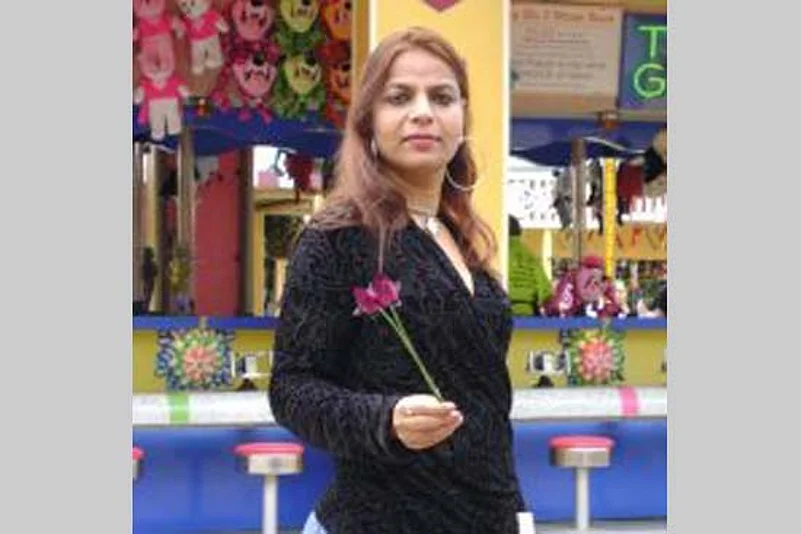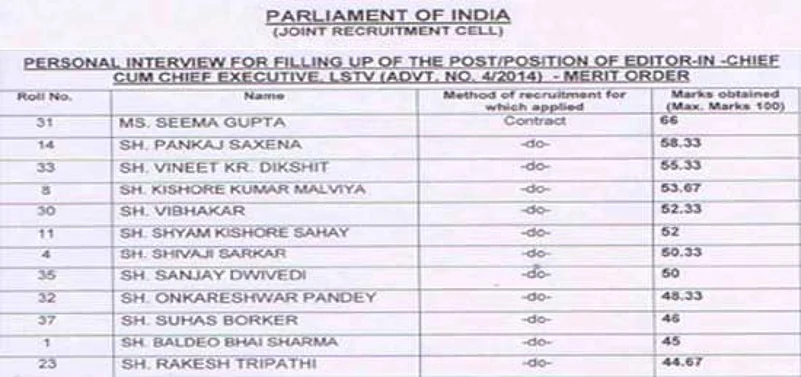The serene office of the Lok Sabha TV (LSTV), inside the Parliament library building, hides a brewing storm. Old-timers talk in hushed tones about the Modi government’s not-so-discreet attempts at controlling the channel and at influencing the programmes on its prime-time shows. They say that never in the short history of LSTV—during which it has earned itself a small reputation amidst the cacophony of nightly news—has the government tried to control the channel in such a blatant, brazen manner.
Insiders say they are sometimes told at editorial meetings that senior officials at the prime minister’s office (PMO) disapproved of certain programmes or of the contents of some programmes. They say that for nine months now, there has been a deliberate attempt to give an “editorial slant” and lay emphasis on telecasting government events live. “Showing government programmes, much like a mouthpiece of the establishment—that is not LSTV’s mandate. But now, instructions come from the top,” says a source.
Instructions are being passed to have certain government activities, particularly events involving Prime Minister Narendra Modi, highlighted. There are also instructions on topics to be debated on prime-time talk shows. Earlier, anchors, producers and guest coordinators for a programme could choose guests and panelists for their shows. But now, instructions are passed on who should be invited. “It shows the inclination of the current set-up,” says an insider. If there are to be three guests on a programme about Modi’s pet project, Skill India, there’s an attempt to ensure that two of them are pro-government. If there is a programme on strategic affairs, experts from two Delhi-based institutions that have a close association with the people in power will definitely be invited.
All this runs counter to the objective with which the channel was started in July 2006. On its website, LSTV says it is “a Parliament channel mandated to telecast live the proceedings of the Lok Sabha—the House of the People—of the Indian Parliament”. Further: “The channel produces and telecasts a whole range of programmes of general interest on issues relating to democracy, governance, social, economic and constitutional issues and citizens’ concerns. Debates, discussions and documentaries, programmes on culture and award-winning films in Indian languages are important elements in the programmes of the channel.” The channel was not meant to be the government’s mouthpiece, says Somnath Chatterjee, former Speaker of the Lok Sabha, whose brainchild the LSTV is. “There was zero interference from the PMO and the I&B ministry, or the government during my time,” he says.
Chatterjee says former prime minister Manmohan Singh was initially cagey about starting the channel but gave in eventually. “Prime Minister Manmohan Singh was initially a little unsure when the idea of the channel was proposed to him because he thought that some members might become more boisterous to gain publicity, but the presiding officer handled it well. We received full cooperation from the prime minister and Priyaranjan Das Munshi, the then I&B minister, in setting up the LSTV.” (It might be noted, though, that before the Modi government, when Meira Kumar was Speaker, there were accusations that LSTV was running too many programmes on her father, Babu Jagjivan Ram.)
Another complaint is that LSTV’s exclusive stories are being hijacked. For instance, soon after the railway budget was presented in Parliament in February this year, LSTV interviewed railway minister railway minister Suresh Prabhu. But Doordarshan ran it live without giving credit to LSTV. Private TV channels, which picked up the feed, gave credit to DD instead of LSTV.

LSTV CEO Seema Gupta
It’s learnt that when LSTV executive director (programmes) Dhiraj Singh questioned its CEO, Seema Gupta, saying that LSTV, as a matter of policy, did not provide ‘clean feed’—footage without the logo that indicates provenance—she replied: “The finance minister and I&B minister along with MoS Rajyavardhan Rathore asked me to give direct feed to DD. Do not question the authority of Shri Arun Jaitley.” Outlook’s e-mailed questions to Gupta went unanswered.
Gupta’s appointment as CEO in September last year had itself raised eyebrows. Many felt there were many journalists far more qualified than her for the top post. Insiders say marketing executives, senior technicians and other staff don’t see eye to eye with her and that work is mostly being managed by junior staff. In the power tussle, two of LSTV’s best known faces—Nilanjan Mukhopadhyay and Paranjoy Guha Thakurta—have left, as their contracts were terminated. Mukhopadhyay’s company, Qualitent Research Group (QRG), used to provide quick research back-up to LSTV. The Lok Sabha secretariat demanded that QRG provide all research related papers on the May session of Parliament at a day’s notice. Since this was an immense task, QRG provided some 2,000 pages of research the same evening and the rest over the next few days. These efforts were rewarded with a termination of its contract—which ran to 2017. Sources said the termination could be linked to Mukhopadhyaya’s biography, Narendra Modi: The Man, the Times, which was not entirely flattering of its subject. This was not taken well by the establishment. There were other points of friction for Mukhopadhyay: Gupta’s “bosses” were upset with some programmes, and she blamed Mukhopadhyay’s role as jouralist and columnist outside of LSTV. But Mukhopadhyay says, “I always delinked my role as service provider to LSTV from that of a commentator and analyst outside the channel.”
As for Guha Thakurta, sources say his left-of-centre ideology, which he wears on his sleeve, was the culprit. The academic and author had conducted some 600 programmes on LSTV during the past eight years on various national issues. When contacted, he said: “I don’t have the foggiest idea why my contract has not been renewed...maybe they don’t like my face.” He survived in LSTV during the UPA regime despite several programmes he ran on controversial issues such as the 2G scam and Coalgate.

It wasn’t all smooth sailing though: in one programme with Kapil Sibal, he asked the minister a tricky question about his son, at which Sibal walked away, and the programme was never aired. Similarly, when Suresh Pachauri was minister of state for personnel, under which the CBI operates, Guha Thakurta asked him why the government had let off Bofors accused Quatrochhi instead of getting him extradited. Pachauri apparently pulled several strings to get that portion deleted.
The attempt to exercise control over LSTV comes even as the Bharatiya Janata Party has attacked RSTV. The channel of the Upper House is under Vice President Hamid Ansari. There were allegations that the channel spent Rs 1,700 crore in four years, during which only Rs 146.7 crore (2010-2014) was spent on salaries, rent, capital cost and other operational expenditure. RSTV termed the allegation a “figment of the imagination” while denying the charges. On June 21, RSTV had come under attack again when Sangh elements tweeted that RSTV did not show the International Yoga Day celebrations at Rajpath. They had to eat humble pie later after Ansari intervened and it was pointed out the channel had indeed shown the event.
Autonomy, it seems, is a mirage.


























